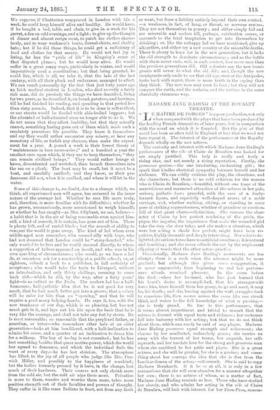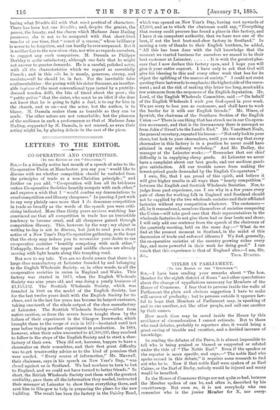MADAME JANE HADING AT THE ROYALTY THE ATE E.
" TE MAITRE DE FORGES" is a poor prodnction, not only I I when compared with the plays that have been produced by the leading French dramatists of later years, but in comparison
with the novel on which it is founded. lint the p!ot of that novel has been so often told in England of late that we need not here repeat it. The interest of the performance at the Royalty depends' wholly on the new actress.
The curiosity and interest with which Madame Jane ITadiug's performance of the rille of Claire de Beaulieu was looked for are amply justified. This lady is really and truly a rising star, and not merely a rising reputation. Firstly, she possesses geuius,—the one irradiating, enchanting gift ; the spark that kindles electrical sympathy between herself and her audience. We can coldly criticise the play, the situations, and the characters ; but there in no cold criticism for the woman who is Claire de Beaulieu,—beautiful, without one trace of the meretricious and mannered attraction of the actress in her pale, serious, pathetic face ; graceful, with the ease of a finelyformed figure, and especially well-shaped arms ; of a noble carriage, and, whether walking, sitting, or standing in some
pose of striking expressiveness, whether of grandeur or emotion, full of that great charm—distinction. She rescues the char acter of Claire by her perfect rendering of the pride, the pique, the impulse, the impatience that make the wounded girl take the step she does take ; and she makes a situation, which
were her acting a shade less perfect, might have been repulsive, highly dramatic and deeply interesting. Tier voice is delightful; its serious tones have no artificial sweetness; it is natural and touching ; and she never offends the ear by the unpleasant clipping of words that the other actors practise.
Occasionally, Madame Jane liading's movements are too abrupt ; there is a rush when the advance might be more gradual ; but although this gives some exaggeration, it is never ungraceful; from begiuniug to end her perform. ance affords unmixed pleasure. In the scene before the duel,—when her husband, who has just learned that his heart's desire is accomplished, that his stranger-wife loves line tears himself from her grasp, to go aml meet, it may
be, his death; and she, leaning against the wall, struggles back to conscious life, then moves across the iooni like one struck blind, and wakes to the full knowledge of what is passing,— she is truly grand. So fine is this performance, that it seems almost impertinent and trivial to remark that the actress is dressed with equal taste and richness ; her costumes fall into harmony with her acting ; but that we do not think about them, which can rarely be said of any player. Madame Jane Hading possesses equal strength and refinemeut; she charms by her unaffected, melancholy grace ; she carries us away with the torrent of her terror, her anguish, her self-. reproach, and her too-late love for the strong and generous man whom she sacrificed to her pride and pique. She is a great actress, and she will be greater, for she is a genius ; and something about her conveys the idea that she is free from the familiar-demon of the actor,—self-conceit. She is said to copy Madame Bernhardt. If it be so at all, it is only in a few mannerisms that she will soon abandon for a manner altogether her own ; there is no actress of whom, as a matter of fact, Madame Jane Hading reminds us less. Those who have studied her closely, and who admire her acting in the role of Claire de Beaulieu, will look with interest for her Fron-Frou, remem
bering what Wsclk did with that most poetical of characters. There has been but one D■2sclee ; and, despite the genius, the power, the beauty, and the charm which Madame Jane Hading possesses, she is not to be compared with . that short-lived wonder of our time, that "comet of a season," whose brilliancy is never to be forgotten, and can hardly be ever surpassed. But it is neither fair to the new-risen star, nor wise as regards ourselves, to suggest any such comparison. M. Damala as Philippe Derblay is quite satisfactory, although one feels that he might not answer to greater demands. He is a careful, polished actor, with all the characteristics which we regard as essentially French ; and in this rac he is manly, generous, strong, and resolute,—all he shoull be, in fact. For the inevitable false sentimentalities—the posing with his sister Suzanne, an insufferable ingenue of the most conventional type (acted by a prettily. dressed wooden doll), the bits of tinsel about the poor ; the "petite prii!re " that the sister, who must be an idiot if she does not know that he is going to fight a duel, is to say for him in the church, and so on—not the actor, but the author, is to blame. 31. Damala makes them as bearable as they can be made. The other actors are not remarkable ; but the pleasure of the audience in such a performance as that of Madame Jane Hading, supported by 31. Damala, is not marred, as even their acting might be, by glaring defects in the cast of the piece.







































 Previous page
Previous page